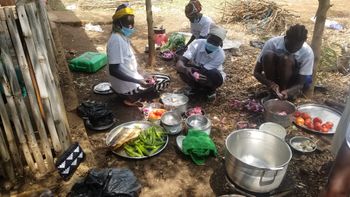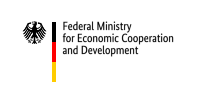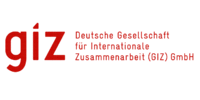Difference between revisions of "Webinar on Cooking Energy in Displacement Settings"
***** (***** | *****) m Tag: 2017 source edit |
***** (***** | *****) m Tag: 2017 source edit |
||
| Line 15: | Line 15: | ||
{{#widget:YouTube|id=YJ_vUJX23wE|height=300|width=600}} | {{#widget:YouTube|id=YJ_vUJX23wE|height=300|width=600}} | ||
| + | |||
| + | |||
| + | ** The opinions shared in this webinar are those of the presenters. For questions, please contact the presenters. | ||
This webinar, second in the series provides a brief snapshot of relevant cooking energy systems such as processed biomass, firewood, e-cooking, LPG, ethanol and biogas. The first part of the webinar will feature short presentations highlighting the applicability, availability, affordability, health and safety as well as environmental aspects of each cooking system. In the second part, the audience can dive deeper into break-out sessions and engage directly with the presenters. This webinar will feature six break-out sessions on the above-mentioned cooking systems. | This webinar, second in the series provides a brief snapshot of relevant cooking energy systems such as processed biomass, firewood, e-cooking, LPG, ethanol and biogas. The first part of the webinar will feature short presentations highlighting the applicability, availability, affordability, health and safety as well as environmental aspects of each cooking system. In the second part, the audience can dive deeper into break-out sessions and engage directly with the presenters. This webinar will feature six break-out sessions on the above-mentioned cooking systems. | ||
Revision as of 08:31, 24 September 2021
Webinar Series: Cooking Energy in Displacement Settings

Safe and sustainable access to cooking energy in displacement settings is a persistent challenge for the humanitarian community. As a result, displaced populations are subject to protection, health, food security risks as well as conflict over natural resources, in addition to experiencing fuel shortages and gender inequalities. It is generally assumed that the markets for energy products and services in displacement settings are at a low level, although displaced people around the world already spend more than $1.6 billion a year to light their homes and cook their food,1 as such there is a significant potential for private-sector engagement in this context, which could result in win-win scenarios for all stakeholders.2 A major constraint for increased private-sector engagement are gaps in knowledge, coordination and mutual understanding between private sector, development and humanitarian actors.
Against this background, GIZ (ESDS and EnDev), GPA and MECS are co-organising a webinar series on Cooking Energy in Displacement Settings.
Webinar 2: All Relevant Cooking Systems in a Word
- The opinions shared in this webinar are those of the presenters. For questions, please contact the presenters.
This webinar, second in the series provides a brief snapshot of relevant cooking energy systems such as processed biomass, firewood, e-cooking, LPG, ethanol and biogas. The first part of the webinar will feature short presentations highlighting the applicability, availability, affordability, health and safety as well as environmental aspects of each cooking system. In the second part, the audience can dive deeper into break-out sessions and engage directly with the presenters. This webinar will feature six break-out sessions on the above-mentioned cooking systems.
Webinar 1: Landscaping
This webinar aims to provide an overview of the stakeholder landscape of the humanitarian cooking sector and to improve mutual understanding as a base for successful cooperation. It will shed light on their approaches and what are their advocating for; success factors as well as common challenges in existing cooking energy interventions.
First in the series, this webinar will feature a presentation providing an overview of the landscape of the humanitarian cooking sector followed by a moderated panel discussion. To get a holistic picture, speakers from humanitarian and development organisations, the private sector, policy consultancy and a community representative will participate in the panel.
Q&A
All Q&A during the webinar are document here.
Summary
Key takeaways from the webinar
Resources
African Clean Energy PROSPERS Presentation
Agenda
| Speakers/Organisation | |
| Introduction | Ranisha Basnet, Energypedia |
| Overview of the humanitarian cooking sector | Anh Tran (Modern Energy Cooking Services (MECS) |
| Panel discussion |
|
| Q&A | All panelists |
| Final Takeaway | Mark Gibson, Global Platform for Action (GPA) on Sustainable Energy in Displacement Settings, UNITAR |
| Closing | Ranisha, Energypedia |
Financed by

Organised by
 |
 |
Co-organised by

|



















